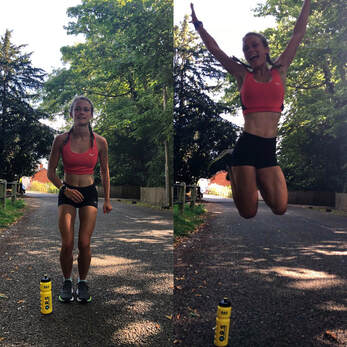|
This is a topic that I feel can never be reiterated enough. Talking about it once will never get people to understand the message. Whether it is young developing athletes, established runners, or someone who knows nothing about the sport, there is still talk about the ‘ideal runner’s body’ which influences how people perceive themselves or other runners. What I write in this blog, is purely my opinion and how I feel the perception of a 'runner's body' needs to change. Lots of runners, probably more than we realise, at some point in their running journey, will have thought that if they weighed less, they might run faster. And for some, who are already relatively lightweight, this belief can be incredibly damaging. It has become ingrained throughout society that the lighter you are the faster you run. Whilst there is less of you to carry, your body also has considerably less energy to operate and function normally, as it is not receiving enough food to fuel what you are asking of it. Therefore, whilst you might be lighter, you don’t have the energy to run fast, let alone enjoy running at an easier pace. It isn’t this extreme in all cases, but it was for me, because what started off as an innocent desire to run faster, when mixed with other stressors, became incredibly damaging. We, as a sporting community need to work together to remove the stereotypes surrounding runners. Not only is it damaging athlete’s performance, but also to their mental state. We need to show young athletes that their body is a positive thing, and they don’t need to look stick thin if they want to improve. Unfortunately, there are still unhealthily thin athletes out there who are running at a very high level, and this only reinforces such beliefs, but if we can show them how many phenomenally success, healthy athletes there are, their beliefs may begin to change. So, what truly should we think of as a ‘runner’s body’?
Put simply, the body of someone (anyone) who runs. Sounds obvious, but it’s not. Ask the majority of people to describe the physique of a runner and they will say skinny, lean, slim, the lighter the better, any of these. We should be educating one another and supporting people in understanding that it doesn’t matter what they look like as a runner, as long as they are healthy and have the energy to train as they would like to, they have the ‘ideal runner’s body’. If you are fuelling yourself sufficiently and don’t feel like you are lacking energy when training, why does it matter what you look like? A healthy ‘runner’s body’ looks different on absolutely everyone. Some people may naturally be quite slight and small-boned, whereas others may be big-boned and larger, and this should be celebrated. It is incredible that the body of a runner can look so different but still run as fast as the next. Be proud of your body. Running alone is a tough sport, and our bodies are incredibly strong and resilient to be able to do all the training we ask of them. Rather than punishing ourselves by restricting what we eat, we should care for and praise our bodies by fuelling them sufficiently. We need to care for our mental health too! Training, followed by restrictive eating, followed by training, so on, is incredibly tiring and exhausting! Giving our minds a break from working hard, by allowing ourselves to eat balanced, non-restrictive diets, will not only benefit our physical performance, but also leave our minds feeling fresher, so they are ready to attack every training session as fresh as possible. So, next time you question whether you should eat that ice cream or have a slightly smaller portion, remind yourself of the amazing things your body has done, and that includes recovering on a rest day, and celebrate by giving your body the fuel it deserves. Ultimately, you should celebrate your body, because whatever the body of a healthy runner looks like, that is the ‘ideal runner’s body’.
0 Comments
Leave a Reply. |
Hannah IrwinI love to run and I love to write, so I write about running! Archives
March 2023
Categories |


 RSS Feed
RSS Feed
